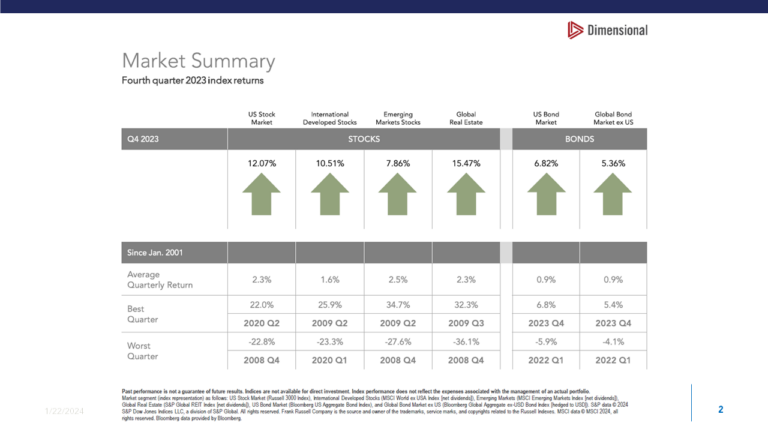Over the last few months we’ve heard many clients express concern that they have a feeling something bad is coming. Very few are able to articulate exactly what they mean by “something bad” but the feeling remains. The reasons have been various:
- An increasingly polarized political environment
- Concern over the prospect of rising interest rates
- Concern over the economy/stock market being overheated
Inevitably, the conversation comes down to one thing – selling stocks now before a downturn occurs, despite mountains of research suggesting that no one in history has been able to time the market reliably.
The math of selling and getting back in later
The first argument against selling now and getting back in “when things look better” is purely mathematical. Not only do you have to correctly predict when the decline will start but you also have to get back in before the recovery happens. If we simply assume a 50% chance of getting either decision right (your chances are probably worse than that given stock market history) then your chance of getting both calls right is only 25%. Those are not attractive odds.
The logical argument
The second argument against selling is logical. Let’s say you sell and the market does go down. You’ll likely feel empowered by being right and continue to believe things will decline. This means you will not want to buy back into the market at the very moment you should. Now let’s assume the market goes sideways. You will probably still feel like a decline is coming but it just hasn’t arrived yet, so you’ll hold off on buying. Lastly, if the market goes up after you sell you feel even worse and it will be difficult to admit being wrong. You’ll probably say you will wait for a pullback and get back in at that point. The problem becomes a vicious circle of emotions that can be difficult to end.
The cost of selling
The third argument against selling is cost. If you’re selling stocks in a taxable brokerage account then there is a good chance you’ll need to pay taxes on any gains you have. This is an immediate (and potentially substantial) cost and automatically puts you in a worse financial position before even seeing what happens in the market. If you are selling in a tax-deferred or tax-free account you will likely face transactions costs to sell your assets, which can add up quickly if you own a lot of funds.
The emotions getting in the way
The last argument is purely emotional. Worry and fear are built in defense mechanisms for most of us. They have allowed us to survive and thrive. It’s very easy to get caught up in worry and lose sight of the long term. Ask yourself: Will I still worry about this in six months? A year? 10 years? The famous saying “this too shall pass” is incredibly useful in investing. It helps us keep our emotions in check when things are good AND bad. Recognize that often the best time to invest is when it feels worst.
I’ll end with this: risk is part of investing. It’s the reason we receive higher long term returns from stocks than we get from cash (assuming we don’t try to time the market)! We have to be compensated for all the worry that can come with investing in stocks. It’s part of the deal we made when we bought stocks. The very best we can do is to accept that risk will always be present in investing and spend our energy on things that we do have some control over such as saving, spending and taxes.
Steven Elwell, CFP®
Vice President


